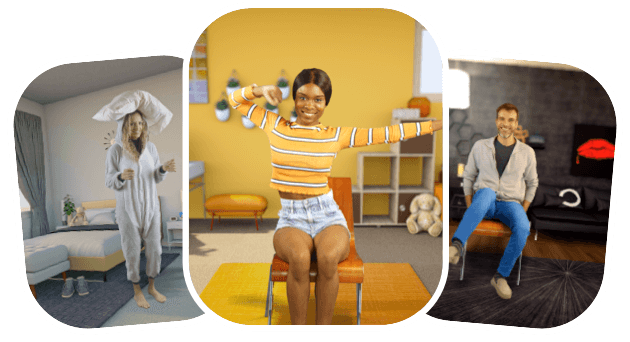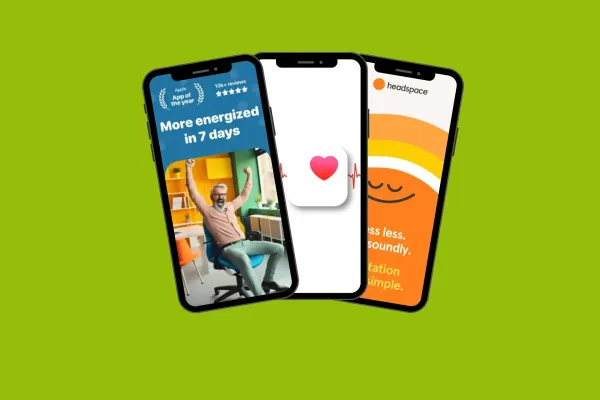Being sedentary affects every fascet of your life. It's part of your overall mental well-being, your health, your productivity, and even your sex life.
There is a secret to achieving a better version of it all. And no, it's not just about releasing those endorphins by getting your weekly dose of 150 minutes of exercise - it's not enough. The shorter time you spend being sedentary, the better it is for your physical, mental, emotional, and social health.
Are you sitting for this?
When you started reading this, were you sitting or lying down? If you were, do you recall how long have you been in that position? If it's more than 30 minutes, please stand up. And if you started reading this standing up - good, you might want to keep it that way until you finish. You will thank us later.
We have nothing against sitting. It's something we unconsciously do and is a part of everyday life. Have a meeting? Sit down. Eating? Sit down. Working at your desk? Sit down (as long as your set-up is ergonomic).
What is problematic is sitting down for more than 30 minutes, sans movement. Simply put, being in a sitting or reclining position for more than 30 minutes without movement is the villain in your story. There is a mountain of evidence showing that the longer time you spend being sedentary, the more likely you are to get chronic diseases, musculoskeletal distress, obesity, multiple cancers, depression, and overall poor mental health.
The good news is that this can all go away with the help of movement, and hence, Wakeout. We know, these claims are steep. But hear us out - our goal, after all, is to keep you moving (just set that 30-minute timer).
Sitting vs Prolonged Sitting
To understand how this works, we need to know what we are up against. According to the International Journal of Behavioral Nutrition and Physical Activity, sedentary behavior is defined as any seated or reclining behavior while awake, with energy expenditure at or below 1.5 metabolic equivalents (METs). Sitting, while you're reading or watching TV, or playing poker, is an activity that falls under the category of at or below 1.5 METs. But isn't being sedentary, normal, you ask?
Here is a clear distinction, though. You can be sedentary, hey, how else will you enjoy that latest true crime documentary on TV? But make sure that your sedentary bout (with a correct posture) does not, and we repeat, does not last longer than 30 minutes. Because if it does, here are the possible physiological changes that your body will undergo.
Starting with the vascular system, ie. blood vessels. When you sit down for a prolonged period, your feet and lower legs can get swollen. This is because of blood and fluid pooling down there (thanks, gravity). Worst case scenario is that you will develop Deep Vein Thrombosis (DVT), where you form a blood clot. Blood clots can be life-threatening because that clot can get dislodged and travel to your lungs causing pulmonary embolism. Though it can be treated, there can be permanent damage to your lungs.
Another affected part of your body, because of prolonged sitting, is the lower back and spine. Aside from postural misalignment (let’s face it, we’re not always sitting properly), prolonged sitting reduces your spine’s flexibility and increases lower back stress. Your gluteal muscles (bum cheeks) get weakened resulting in hip and low back pain. Your bones also get weakened (osteoporosis). Can you imagine your productivity and energy levels (and sexual performance) while experiencing pain? That’s more visits to your chiropractor (and they are not cheap).
It’s no secret that being sedentary increases your risk for heart diseases and the development of the metabolic syndrome. Another popularly known outcome of prolonged sitting is weight gain and obesity, plus an increase in waist circumference. Say goodbye to your current clothing size, you’d need to change into a bigger one (again, not cheap). Not to mention, cancer.
And if all these consequences are still not getting to you, prolonged sitting is also connected to increased feelings of depression and anxiety. Studies show that the longer time you spend sitting, the higher the risk of experiencing anxiety, depression, and low levels of emotional well-being. They found out that large amounts of sedentary time are linked with sleep disorders, which are comorbid with mental health issues. The participants experienced less sleep and greater levels of mood disturbance and stress. Your work and personal life will take a huge hit when you don’t get enough sleep and when your mood swings are through the roof.
We don’t know about you, but all these effects sound like hitting a BINGO in the game of which of the following will make your life miserable. Why would you want this if you can do something about it?

The 30-minute rule

In case you noticed, we have been mentioning the 30-minute rule for some time now. Don't stay sedentary for more than 30 minutes - that's the rule.
Here's where the science gets interesting. It doesn't matter whether you exercise daily, or fulfill the required 150 minutes/week of moderate-intensity exercise. Because if you stay sedentary for more than 30 minutes throughout the day, you negate everything.
Picture this - you jog in the morning for an hour before work every day. You feel great. But then, at work, all you do is sit. You only stand up when it’s lunchtime. It's as good as not jogging at all.
Okay, we will indulge you. Let's say you jog in the morning and the afternoon, plus increase your exercise time to 1.5 hours at a time. That's a total of 3 hours a day! Still, sad to say, the only positive outcome of increasing exercise time was an increase in sleep duration. If you still stay sedentary throughout the day, it won’t help with your mental health, nor with the physiological effects of prolonged sitting.
So, increasing your exercise time won't help. What can you do?
In the studies, those who moved after sitting down for no more than 30 minutes at a time, had the lowest risks. Hence, the 30-minute rule.
It does not matter what you do as long as you move and break up your sedentary bout. Stand up, and walk around. Have a healthy work timer at your desk. Do a Wakeout. Go to the kitchen, drink water, and keep standing. Go dust off some photo frames, and arrange some throw pillows on the sofa. Just move.
And this is why Wakeout works. You can set a reminder every 25 minutes and then choose a fun exercise. Listen, it doesn’t have to be a full-blown workout. You just have to disconnect your bum from wherever it’s resting.

Movement is medicine. And moving every 30 minutes is the key to an increase in productivity and energy, better mental health, and overall physical health.

Wakeout











